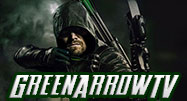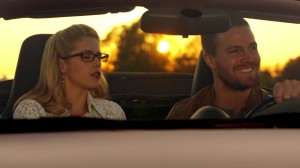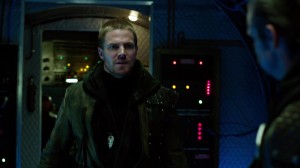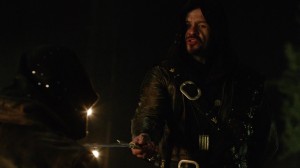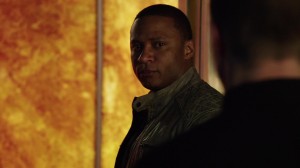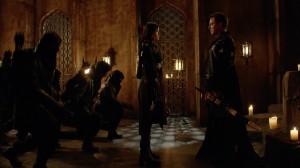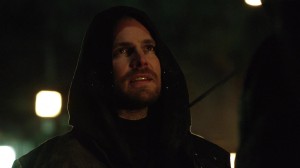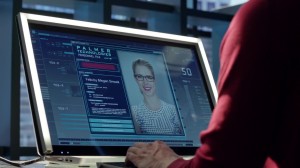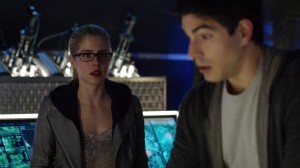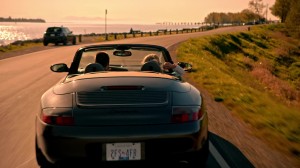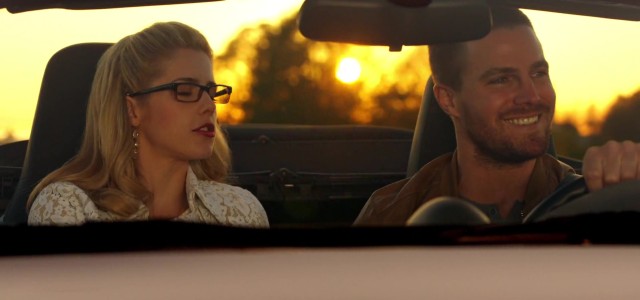
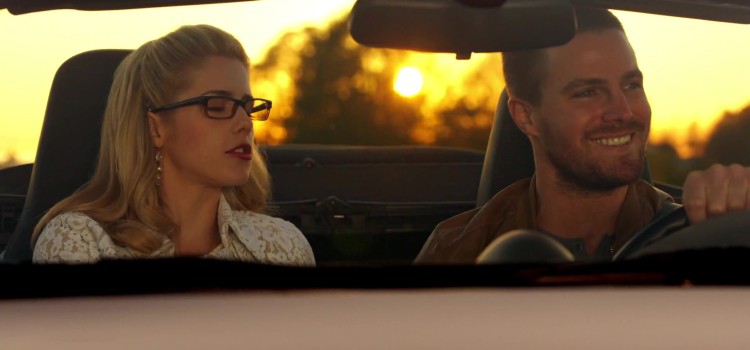
Arrow #3.23: “My Name is Oliver Queen” Recap & Review
Recaps & Reviews May 23, 2015 Matt Tucker

SUMMARY: A rushed and disappointing finale exemplifies its inconsistent season.
If you have not seen this episode yet and do not wish to be spoiled, do not continue reading!
Recap
Oliver attempts to kill Ra’s al Ghul and destroy the bioweapon by sabotaging and crashing the plane on its way to Starling City. Ra’s escapes to complete his attack on Starling and vows to keep coming at Oliver if he survives. Oliver and Nyssa crash land the plane. In Nanda Parbat, everyone awakes in shock at having survived. Malcolm explains that he inoculated them against the bioweapon as part of Oliver’s plan. The Flash arrives to help free them.
Oliver & Nyssa meet up with the team at Palmer Tech. Diggle is none too happy to see Oliver, but they all decide they need to stop the attack by Ra’s. Laurel goes to talk to Quentin, who has started drinking again, to mobilize the police. Ray works to develop a nanotech anti-viral containment system. Felicity tries to track down Ra’s’ movement by satellite but can’t. They review anomalous events in the city and discover that Damien Darhk is in town. Assuming Darhk is a target, they try to capture him to use as leverage to stop the virus attack. Darhk is already gone and Ra’s puts his plan in motion.
The team, including a masked and suited Thea, tracks and stops 4 assassins who have the virus in their blood and plan to release it by exposing their blood. Ra’s summons Oliver to the dam for a final confrontation. Some of the cops have been called to the dam to take out whoever wins the fight. Quentin calls Felicity to warn her. Oliver and Ra’s sword fight until it appears Ra’s will win. Oliver grabs his sword, slashes Ra’s’ side and stabs him through the chest just as he’d done to Oliver on the mountaintop. Believing Oliver was accepting his mantle, Ra’s is pleased and dies.
With the city out of danger, Oliver thanks everyone for doing their part. He announces that since the Arrow persona was killed off, he doesn’t want to be a hero any longer. He wants to explore a new life with Felicity. He leaves the city in their hands. Diggle bugs out. Oliver catches him and encourages him to continue the fight. Diggle says he’ll think about it. Later, Oliver gives Ra’s’ ring to Malcolm. Malcolm assumes the mantle, having survived the blade of Ra’s al Ghul earlier as well. Nyssa accepts his leadership but vows to avenge Sara’s death.
Ray attempts to adapt the miniaturization he developed for the anti-viral containment to parts of the A.T.O.M. suit but appears to blow himself up in the process. Thea accepts her role as Red Arrow/Speedy. Oliver and Felicity drive off own the coast with Oliver saying he’s happy.
FLASHBACKS
Maseo and Tatsu quickly have Akio cremated. Oliver turns his attentions to Shrieve, who he tortures for hours. Tatsu is horrified to discover what he’s done. Maseo shoots Shrieve in the head to avenge his son. Broken and feeling without honor, Maseo leaves Tatsu. She decides she will sequester herself in a monastery in her home city in Japan. Oliver is rattled by his darkness and decides to travel by boat to Coast City rather than return home.
Review
“How can the show go on?”
Procrastination, thy name is … well, this review. It’s been an admitted struggle to put thought down in word in the week since the third season finale of Arrow. Even harder when witness to such a glorious ending to The Flash‘s uber-successful first season. Not that there haven’t been many of them swirling in the time since. Certainly that Wednesday evening and into Thursday was an impressive melange of spit and vitriol that begged to be expelled with tremendous force from one’s being in a display that could only have been embarrassing.
To be frank, my first impulse in writing a review of the finale was a simple, yet thoroughly complex two-word response: “Hated it.” There’s honestly a part of me that has been and is still tempted to publish it just like that. At the same time, I’m not the hugest fan with how reductive that kind of modern feedback is.
It seems silly to ever talk about anger in relation to anything that could be seen as ultimately trivial as a television show — not a view I necessarily share — but there was clear frustration and disappointment with the finale and Season 3 on the whole. It’s the kind of disappointment that makes one want to reassess future investment of time and care.
Still, there has been investment in character, in plot, in relationships, in philosophies that make it worth examining an hour of television that has no doubt divided the fanbase. It should be noted that the season capper was the most watched of the series’ season finales to date. That’s particularly interesting given that the show had some of its lowest ratings throughout this up-and-down season. But we’re not here to talk ratings numbers.
Warning: Words Ahead
Alright, time to push through the apathy…
Executive producer Marc Guggenheim spoke about the finale blowing up the show during the media blitz in the hours running up to the episode. It’s safe to say they did just that. Yet, aside from Ray Palmer’s accidental explosion while testing new miniaturization capability, the hour wasn’t anywhere near as exciting as Guggenheim’s tease suggested.
If anything, the finale was perfect for the season. Perfect in the sense that it was a good microcosm of all of the issues that have plagued the show this year and made it generally an inconsistent and confounding affair.
Lest you think this is going to be another screed against the ills and evils of Olicity foisted upon the show — or just another screed about it — this is more about a series that seems to have lost sense of itself. Hell, they’re even talking about Season 4 being lighter in tone. It’s more than understandable to work away from the pall that a major character’s death can hang over a season, but you don’t want to overcorrect to the point that the show becomes something it shouldn’t. The distinction of Arrow‘s place in the burgeoning DCwU is that it is darker, more intimately involved in the stark pathos of the individual than in the broader and more colorful themes that The Flash and DC’s Legends of Tomorrow now explore with unbridled glee. It travels in the grim and dinginess of the streets of this suddenly fantastic world. Going lighter can rob that essential element of the series.
(In all fairness, Guggenheim’s comment about the transition is “It’s not going to radically change.” He mentions injecting “a little bit more humor” into the series rather than outright redesigning the show.)
Someone else, something else…
It’s curious when you hear comments from the producers about the Season 3 finale closing off the chapter of the first three years of the show. Normally, this would be fairly innocuous, the kind of thing you would hear at the end of a season for a series in transition. It’s equivalent to the talk of a “rebuilding year” in sports for a season that didn’t go to plan or an upcoming one that is definitely filled with a lot of questions. The problem here, though, is that we heard these same comments last year. This raises concern about the future of the series.
In some ways, those remarks from last year were quite true. The series was decidedly different in the overall quality department in comparison to its first two seasons. It’s hard to know if that’s because launching The Flash took some of its vim and vigor by splitting the creative forces behind the series, or if it was the result of a less-than-concrete theme and arc broken for the season. We’ve talked at some length before about the more nebulous concepts behind dealing with identity and the existential questions it could raise. Such a narrative thrust can leave it harder to find a true antagonist and tangible threat to combat; the conflict can become so internalized that it runs the risk of alienating or boring the audience.
They were able to stumble upon somewhat of a happy medium between the philosophical and the supervillainous in selecting Ra’s al Ghul as their Big Bad on the season. Yet, so much of the execution of the season felt like they were discovering what they could do with him rather than telling a directed story. We finally get this wonderful little arc about Ra’s pushing Oliver to accept the offer to take his place atop the League of Assassins, expertly driving Oliver to a point where he had no alternative than to accept. Unfortunately, it occurs so late in the season that we never get time to fully explore the ramifications of that. It culminates in a decent albeit flawed mini-arc of three episodes to tie up the season and Oliver’s quest for self; the staff still have a way of building the concept of an effective end-season run. But while the result presents some very interesting questions of the series and its characters, the compact nature gives no time to really explore them.
What we’re left with is a series of reversals on Oliver’s part that feel haphazard, shoddily planned, and more than a little coincidental. What’s worse is that, in the end, they undercut a lot of what could have been great tension riding into this finale. In particular, nothing is really made of the fact that Oliver and Nyssa were just married at the end of the last episode. Admittedly, it was but one item of a checklist of things Ra’s needed to get out of the way for Al Sahm to take his ring, but there was absolutely no consequence to it. It kept Ra’s’ trust enough to get Oliver on that plane flying to Starling City, and served as set-up for a silly little throwaway line at the end of the episode, but little else. Within minutes of the episode start, Oliver drops his ruse and sets off what should be a taut game of cat-and-mouse as he attempts to put a stop to the biological threat and take down the Demon’s Head once and for all.
Should be. If only.
That’s the quite odd thing about this episode. Despite all of the consternation over it, it’s actually not an outright terrible episode of the series. It’s quite far from a standout, but aside from choices made and its debacle of an ending, this was a decent hour that moved along at a good clip when it wasn’t bogged down in blatant exposition. The problem is the set-up left it in an awkward position where it had to cover a lot of ground quickly. Instead of feeling like a breathless hunt, though, it felt rushed and sadly lacking in impact.
How impressive could the raid on Damien Darhk’s hotel penthouse have been if it had more time to breathe, more time to focus on the precision needed amidst the desperation of the play? It would’ve felt like much more than an open plot point for next season.
For that matter, what about the tension between Oliver and Diggle? Sure, this is something that will have long-lasting effects on their relationship, so it’s not really a matter of expecting resolution in one episode. There’s also a significant threat that forces their hands in working together. Yet, a single punch and a few snarled words felt far too simple and short of a reunion and reckoning for what’s supposed to be a severe rift for the show. Even more curious, when the team is triumphant and Oliver’s paying them all kudos, there’s Diggle sitting and listening to it. The brief words and handshake at the elevator felt too pat given this fundamental betrayal from John’s point of view, certainly much more than the lip service he paid it. More so because it was on Oliver’s way out of the life, for all intents and purposes.
All allowed by the limited time were these few moments to brush up against this broken bond, and the true weight and consideration behind it was diminished as a result.
We follow his lead … for now.
Coming at it from the other side, with knowledge of Oliver’s true allegiance for the last two episodes, the sense of disloyalty from Diggle felt undercooked for how important it is supposed to be. There are some logistical aspects to consider, but this final arc would’ve been better plotted if Oliver’s deception was discovered by the audience at the same time as Ra’s. While I certainly enjoyed the way Oliver’s aid for his friends was thwarted at every turn last episode, adding to a sense of being in far over his head, the better narrative choice would’ve been to keep up the feeling of devastation at his unconscionable turn to the dark side without letting us peer behind the curtain. (Even if most of us had a pretty good idea that Oliver was still on the side of good all along.) The team still could’ve come to Nanda Parbat at Malcolm’s insistance, been introduced to Tatsu with both trying to convince them of Oliver’s true plan, and captured by the League without explicitly revealing the truth on-screen. This hour could still open with everyone awaking to confusion and a fun bit of rescue from The Flash.
It might be a small distinction, considering they all believed Oliver had left them to die in the dungeon and were back to a feeling of total betrayal, but it would’ve kept more of an air of intrigue and suspense going until the moment the reveal mattered most. As it stood, Oliver finally confronting Ra’s on the plane had its punch stolen.
As confrontations go, there was a nice sense of poetry to the final showdown between the Demon’s Head and Warith al Ghul on the dam. Having the two switch places from the result of their earlier duel on the mountain presented a good bookend. It’s just a shame that the actual sword fight itself felt lackluster. It’s difficult to say whether it was the space, or perhaps a limitation of movement by the costuming, or just what ended up hampering the affair, but it was definitely a lesser effort from a stunt team that is by far one of the best on television. Worse, instead of elevating the threat and relevance of Ra’s, it diminished him in nearly every way. Yes, the League will still prove to be an active part of the show for the foreseeable future, but this particular Ra’s al Ghul will seem like a footnote. That’s a disservice to what I felt was a very effective turn by actor Matt Nable.
It seems quite fitting, though, that Malcolm Merlyn assumes the mantle and leadership of the League. Some have argued that he had planned this all along. For as devious and conniving as he is, that doesn’t hold with the events as they unspooled. Malcolm forcing Oliver to have to stand against Ra’s to protect Thea had two possible outcomes as he saw it, Oliver’s death or the end of the current Ra’s. Either fulfilled the blood debt owed and set him free from the League. That Oliver survived and the prophecy of the succession of Ra’s came into play wasn’t anticipated. It was only then that Malcolm took advantage of an opportunity, and not until Oliver came to him about the offer. It still had to evolve. Malcolm mentions to Nyssa that he too had survived the blade of Ra’s al Ghul when he wasn’t killed after his capture and torture earlier in the year. This needed to happen by League law for his ascension to be legitimate. It will be interesting to see how tenuous the peace between Malcolm and Oliver is as time moves on.
…to save my city. And I did.
But Oliver’s given up the Arrow and crimefighting, you say. Why would he have to worry about Al Sihr al Ghul? That’s for the “masks” to deal with.
Guggenheim has stressed that the idea of treating this season finale much like a series finale is very intentional. Oliver Queen, the man who had everything about his public identity ripped away and the vigilante whose heroic persona was killed after being painted a menace, found a happy ending. He got to live and he got to walk away. There is certainly an aspect of that ending that is well-earned. After eight years in a life far different than he’d ever expected or planned, he has a chance to explore something more personal and selfish, something a bit more … normal. One can’t fault Oliver nor can one necessarily fault the impulse on the part of the writers and producers.
This is Oliver’s Superman II, his “Spider-Man No More.” And that’s perhaps the biggest disappointment on the season.
The struggle with identity and having a sense of self outside of the mask and costume has become one of the most well-tread tropes of live-action superhero adaptation. This summer’s blockbuster Avengers: Age of Ultron features a scene between Tony Stark and Steve Rogers where Stark justifies his pursuit of creating Ultron as a means to finally get them out of the fight. He wants the heroes to be able to retire in peace as the ultimate goal. Superman, Spider-Man, and even Batman haven’t been immune to this treatment. It’s an understandably human response and endeavor. It’s also become thoroughly predictable.
With the theme of identity this season, this was really one of those resolutions you were hoping they would avoid. How often have we seen the hero turn away from his destiny in superhero stories only to have it blow up in his face? That’s not to say that they shouldn’t be looking for the opportunity to enjoy things in life. Even with a calling, there should remain some measure of free will involved. The burden of being a hero, like the titan Atlas hoisting the world up on his shoulders, is another familiar and overplayed trope. Balance is the key to anything in life, and Oliver does need to explore that appropriately. It would be more interesting if they’d found a more creative fashion in which to do that.
The one thing you have to commend the show on with this is that it’s the latest in a line of bad choices that Oliver has made. If there’s a single aspect that should define Arrow‘s Oliver Queen in the pantheon of live-action heroes, it’s that the guy is tremendously flawed and frequently steps in the wrong direction. We’ve appreciated the boldness of the show to actually embrace that of its lead character over the last three years. That proves a bit of a salve on the burn of such an obvious and tired turn of events.
Next season on ‘Felicity Smoak’…
While good portions of the episode zipped along, there were also stretches of extreme exposition seeded throughout that proved both speed bumps and unfortunately disrespectful of the audience. Sadly, Felicity was stuck with most of this dialogue, and one sure wouldn’t have envied Emily Bett Rickards for it. Of particular note is the whole exchange between the original Team Arrow where Oliver explains that he had intended to take Ra’s and the Alpha Omega bioweapon out in the crash of the plane. It can be very easily inferred by the audience that Oliver’s expectation was that he was going to give his life in the effort. It’s one of those things that didn’t need to be explicitly stated. Yet, they saddled Felicity with this thoroughly unnecessary point-by-point spelling out of exactly what he meant. Sure, she’s upset at the notion, but it came across as a knock to both the audience’s intelligence and hers. What’s more is that she took it as such a horrendously offensive concept as if she hadn’t been involved in the Arrow’s escapades for the better part of three years. Oliver sacrificing himself to take out the enemy is absolutely within his mindset. She can be angry with it, but why should this surprise her at all?
Another of these lamentable over-expository lines is when Diggle and Red Arrow Thea take out the League guy in the plaza and realize that Ra’s has used his own men to incubate the airborne virus and spread it by their deaths in populated locations. The guy slashes his own throat, giving us a visual clue and understanding that exposing his infected blood puts everyone in danger. This is right after Diggle announces the discover/conclusion out loud. Yet, here’s Felicity explaining that it “looks like the virus spreads when blood hits the open air.” Yes, she’s informing Laurel and Nyssa to be aware of the danger, but you can approach this without having to repeat what we’d just seen. Trust your audience to know what’s going on by what they are witnessing rather than having to hold their hand through dialogue.
A bigger point of contention, though, is the aggrandizement of Felicity Smoak. Something very similar occurred with the character of Chloe Sullivan on the series Smallville, and it’s a bit odd that both characters share a lot of familiar traits. This is a delicate subject, so I’ll tread carefully here as it’s almost positive that some will take this to be some kind of rant against female characters growing and evolving. Nothing could be further from the truth. It’s been nothing but thrilling to see how Laurel and Thea have been changing and improving this year. How can anyone not be in favor of a character growing and coming into their own? Especially when that character was once one of your favorites.
The issue is when a character’s ability and importance are inflated to unbalanced levels, proving a detriment to other characters and the series as a whole. In the case of Chloe Sullivan, it wasn’t enough that she was intelligent, loyal, resourceful, and a tremendous sounding board for her best friend, Clark Kent. That she could be a hero based on her own abilities. No, they had to give her her own super powers. Then, they had to thoroughly change those powers. Then, they had to turn her into a complete savant with computers who eventually built a network that assembled all of the heroes. She became a deus ex machina for the show, and while I loved that she was Watchtower, the progression to get her there was unnatural. The fact that most of the heroes could hardly function without her involvement — including frickin’ Superman — felt less like empowerment and more like wish fulfillment while diminishing those around her. They made her god-like and sadly it tarnished the charm that made her so relatable in the first place. (Allison Mack’s terrific performance was really what kept Chloe tolerable throughout.)
Felicity now falls into the same trap. Her intellect and technical ability are truly marvels to behold, and she easily earns her place on Team Arrow. Yet, since last year, they’ve been mythologizing that ability to levels that are just far too convenient, not only for Arrow but for the entirety of the DCwU. When you have a brain trust like the crew over at S.T.A.R. Labs who frequently build outstanding tech on the regular casually mention how they don’t have “Felicity levels” of computer ability, it starts to become cloying not cute. And while there’s some character justification to Felicity hiding out in the Queen Consolidated IT department, her M.I.T. education and no doubt well-known levels of intelligence, as established in this year’s “Secret Origin” episode, make it unrealistic that she would be hired by such a prestigious corporation for such a menial job.
It’s understandable as writers to want to have some quick-fix gadgets to get you out of a bind, especially working on a weekly television series. Still, using Felicity as one such crutch hurts her authenticity in the long-run. What she accomplishes starts to feel less earned and far more given, and you never want to place your characters in that kind of space. That goes double when you suddenly start making them the superhero of the story with no prior exposure.
When Ray Palmer was tasked with creating the nanotech containment system for the virus and his A.T.O.M. suit hung conspicuously behind him during scenes with he and Felicity, the feeling that they were going to find a way to get her into that suit began to creep in. Hope fell apart when it was, indeed, revealed that she was the one who rescued Oliver from his fall off the dam. Let’s set aside the fact that the dimensions of the suit would be too huge for her to be able to properly use it, and the fact that the guy who created the thing had a hell of a time trying to first use it while she handled it with relative ease, the visual felt like another way in which they were trying to bolster the Legend of Felicity Smoak. And this after they had actually given her Oliver’s “someone else, something else” dialogue earlier in the episode.
You and me could write a bad romance.
This course of events truly solidifies my distaste for the Olicity relationship, and there is one specific moment you can point to as the very heart of the issue. Ray’s working his ass off to develop an ability to save thousands of lives and Felicity’s only concern is for Oliver. It’s thoroughly selfish in a way that makes the character unlikable. It’s supposed to be sold as romantic, someone caring so much for the love of their life that they will do anything, risk anything to save and/or protect them. It, instead, comes off as a betrayal of the principles each character held dear for so long before this season. This harks back to Felicity’s initial abandonment of the Arrow’s crusade in the immediate aftermath of hearing about Oliver’s death after facing Ra’s the first time. Nothing any longer is about the greater good; it’s only about the two of them.
In full disclosure, I am a horrendously hopeless romantic. Rom-coms and romantic dramas are two genres of film I frequent. I am also a huge proponent of the romantic angles included in superhero stories, both in the comics and in the film and television adaptations of them. They are an integral part of the human experience and should be fully addressed in any long-form storytelling that is hoping to explore every facet of characters’ humanity.
What one finds with Oliver and Felicity, however, is that they’ve become dependent on one another in a badly idealized way that’s neither romantic nor realistic but detrimentally co-dependent. They frequently compromise their values and their good sense in service to each other. And when it wasn’t, their grief and angst tore at the very fabric of the team more often than not. Drama is certainly expected, especially in TV, but romance should be additive to a person. Certainly to characters on a series where the audience is going to invest their time and attention.
At the beginning of the year, Stephen Amell stated that Felicity was the one woman for Oliver this season. That bore out, and one can only hope that having explored it they’ve gotten Olicity out of the show’s system. This has to be chalked up to another of Oliver’s bad choices. No amount of car commercial endings changes that.
Failing the city or not.
Arrow avoided the sophomore slump last year with a season that set the bar high, not just for itself but for all superhero television series. Other series have stepped up and catapulted far above that bar, including a rejuvenated Marvel’s Agents of S.H.I.E.L.D. and a sister program in The Flash that benefited from the creative experience with Arrow to hit the ground running. The exceptional Daredevil also threw down a gauntlet on the street vigilante front, and it will be interesting to see how the show responds, if at all. This season dolefully didn’t measure up to that bar, and the finale episode provides a working example of that.
That’s not in any way to diminish the talent involved on the show. The technical staff, including directors, still managed to bring a competent and engaging visual product every week. And the cast was uniformly strong and game throughout the year, even when tasked with regrettable or aimless things to do. In particular, Stephen Amell remains the rock of the series and worked hard to make Oliver’s nebulous conflict matter as they searched around for the directions to take it. Even for as much guff as Felicity gets this year, Emily Bett Rickards is as engaging a presence as ever. Here’s hoping they provide her with a wider palette to paint with next season.
The fault this year really lies in story, and that makes this hour a disappointment. Missed opportunities to provide tension and real consequence deflate the impact. Sure, there are questions and plot threads left open, including the big one of what happens to Arrow when the Arrow no longer exists. Yet, because of the lack of thrust behind it, this odd “cliffhanger” they wanted to leave everyone with doesn’t necessarily encourage a strong desire to have to pick the show up again in the fall. It remains to be seen how they can bring Oliver Queen back to Starling and with him the audience.
Odds & Ends
- Felicity’s middle name is Megan. Her email address is smoakfelicitymegan@gmail.com.
- If Ray is believed dead and paperwork hadn’t been shifted, it’s possible Felicity still ends up owner of Palmer Tech until Ray’s return, even though she resigned.
- “The city’s under attack, must be May!” Great meta joke.
- The episode goes exceptionally dark for a moment during the flashback. That shot of a spent Oliver dangling the blood-soaked hammer near a beaten unconscious Shrieve was viscerally disturbing. Then, Maseo taps the general once in the head. Surprisingly gruesome.
- When they first mentioned the Hong Kong attack being five years ago, it sounded like an error. But since it took place two years before Oliver returned to Starling City, and it’s been three years since he’s been back, it actually lines up right.
- “Do you see anyone in a League of Assassins outfit? That would be a dead giveaway.” Funny line made all the better by Oliver turning to face the assassin sent by Ra’s to summon him to the dam immediately after it.
- Two names appear on the ship Oliver hops from Hong Kong on his way presumably to its home port in Coast City: Wallace, which might be a company name, and Triton’s Daughter, the vessel name. Wallace might be a nod to Wally West, the character who eventually assumes the mantle of The Flash from Barry Allen. And Triton’s Daughter could be an oblique reference to Aquaman. And no, that doesn’t mean in any way both are bound for the show.
- Might we, though, see Hal Jordan introduced on the series next year. Coast City is home of the Earthbound Green Lantern, and The Flash had a reference in its penultimate episode to a Ferris Air test pilot that went missing.
Matt Tucker Editor/Senior Writer/Reviewer
Matt Tucker is a stage and film actor, writer, Seattleite, comics nerd, sports fan, and aspiring person. Someday, he’ll be a real boy. He's an editor and senior writer for KSiteTV network (GreenArrowTV, DaredevilTV) and the sports blogs Sonics Rising and Cascadia Sports Network. Follow him on Twitter at @MattBCTucker or @TuckerOnSports
Arrow Reunion: Calamity Jane Now Available on Tubi
News Jun 17, 2024
Bid on a Piece of Arrow (and Flash) History!
News May 22, 2024
Arrow Season 8 Blu-ray & DVD Coming April 28
News Feb 5, 2020
End of an Arrow: Thoughts on the Series & Finale
News Jan 28, 2020
